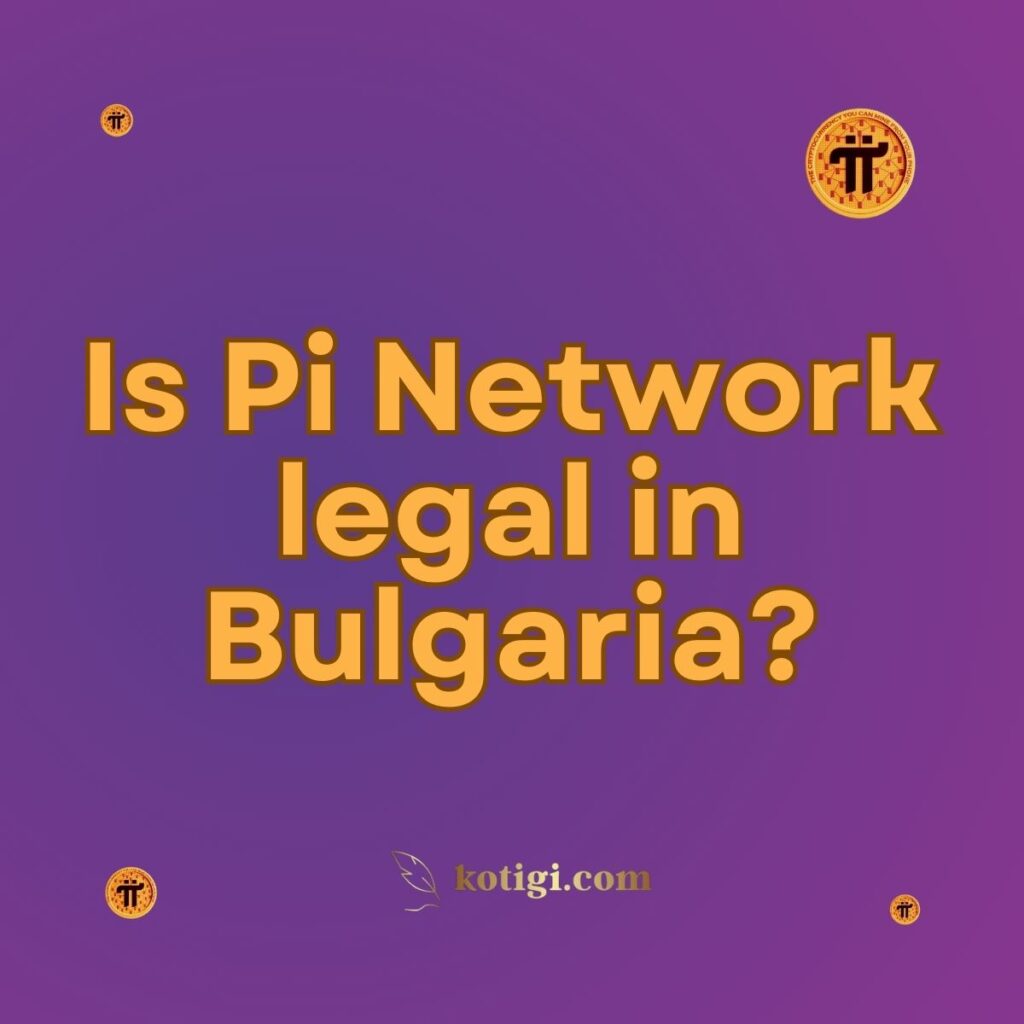
Is Pi Network legal in Bulgaria?
Yes, Pi Network is legal in Bulgaria. While there are no specific regulations governing Pi Network or mobile mining, cryptocurrency activities are generally permitted as long as they comply with Bulgaria’s financial, tax, and anti-money laundering (AML) laws.
Introduction
With the growing interest in cryptocurrencies globally, many Bulgarians are curious about the legality of Pi Network. As a mobile mining platform, Pi Network offers users the opportunity to mine Pi tokens through their smartphones, raising questions about its legal status in different countries. In Bulgaria, the legal framework for cryptocurrencies is evolving, but no specific laws target platforms like Pi Network directly.
This article will explore the legal landscape for Pi Network in Bulgaria, including the country’s general approach to cryptocurrency, taxation requirements, and compliance with anti-money laundering laws. We will also highlight how Bulgaria’s stance on digital currencies affects Pi Network users and what they should be aware of when engaging in mobile mining activities.
Overview of Cryptocurrency Regulations in Bulgaria
Legal Status of Cryptocurrencies
In Bulgaria, cryptocurrencies are legal, and individuals are free to buy, sell, and mine digital currencies, including Pi tokens. However, the Bulgarian government does not recognize cryptocurrencies as legal tender. Instead, they are viewed as financial assets, similar to stocks or commodities. This classification allows Bulgarians to engage with platforms like Pi Network, provided they follow existing financial regulations.
Bulgaria’s Approach to Cryptocurrency Platforms
While Bulgaria does not have specific regulations for mobile mining platforms like Pi Network, the general approach to cryptocurrencies is one of cautious acceptance. The government does not impose significant restrictions on mining or trading cryptocurrencies, allowing Pi Network to operate legally within the country. Nonetheless, users are advised to stay updated on any potential regulatory changes that could affect the platform’s legal status.
Compliance with AML and KYC Regulations
Anti-Money Laundering Requirements in Bulgaria
Cryptocurrency activities in Bulgaria must comply with the country’s anti-money laundering (AML) laws. Bulgaria is a member of the European Union, which means its financial regulations align with EU standards, including strict AML requirements. The Bulgarian National Bank (BNB) monitors financial activities to ensure compliance with these rules.
Although Pi Network is not classified as a financial institution, users are encouraged to complete the platform’s Know Your Customer (KYC) process to ensure compliance with AML standards. This process helps confirm the identity of users, reducing the risk of illegal activities within the Pi Network ecosystem.
KYC and User Verification on Pi Network
Pi Network’s KYC verification is crucial for users in Bulgaria who wish to engage responsibly with the platform. Completing the KYC process not only aligns with Pi Network’s guidelines but also ensures that Bulgarian users remain in compliance with AML regulations. Failure to complete KYC verification could limit a user’s ability to fully access Pi Network features and may pose a legal risk if regulations become more stringent in the future.
Tax Implications for Pi Network Users in Bulgaria
Cryptocurrency Taxation Guidelines
The National Revenue Agency (NRA) in Bulgaria requires individuals to report any financial gains from cryptocurrency activities. While Pi tokens are not yet tradable, once they become available on exchanges, Bulgarian users will need to report profits from their mining, selling, or trading activities. Cryptocurrencies, including Pi, are subject to personal income tax or capital gains tax, depending on the type of transaction.
Pi Network users in Bulgaria should keep detailed records of their mining activities and any future transactions involving Pi tokens. These records will be essential for tax reporting and to ensure compliance with Bulgarian tax laws.
Reporting Cryptocurrency Earnings
As cryptocurrency gains are taxable in Bulgaria, Pi Network users must report any future earnings related to Pi tokens on their annual tax returns. It is advisable to consult a tax professional to ensure accurate reporting and compliance with Bulgaria’s tax laws. Neglecting to report cryptocurrency income can result in penalties or fines from the NRA.
Financial and Legal Risks of Participating in Pi Network
Risks of Involvement in Cryptocurrency
As with any cryptocurrency, Pi Network carries inherent financial risks. Cryptocurrencies are known for their volatility, and the value of Pi tokens may fluctuate significantly once they become tradable. Bulgarian users should be cautious and aware that any financial losses they incur through cryptocurrency activities are not protected by the government.
It is essential for users to conduct their own research and fully understand the risks involved before engaging with Pi Network or any other cryptocurrency platform. Bulgaria’s regulatory bodies do not provide financial compensation for losses in unregulated digital assets.
Compliance with Bulgarian Financial Laws
Although Pi Network is currently legal in Bulgaria, users must comply with all financial regulations, including tax and AML requirements. Non-compliance can result in fines, legal consequences, or restricted access to the platform. By completing the KYC process and maintaining accurate financial records, users can mitigate potential legal risks.
Bulgaria’s Position on Blockchain Technology
Government Support for Blockchain
Bulgaria has expressed interest in blockchain technology, recognizing its potential to innovate various industries. The Bulgarian government has implemented blockchain initiatives, particularly in the financial sector, to enhance transparency and security. This positive outlook aligns well with Pi Network’s vision of a decentralized, user-friendly ecosystem for mobile mining and cryptocurrency transactions.
Integration of Blockchain in Bulgarian Industries
Blockchain technology is gaining traction in Bulgaria’s private sector, with industries such as supply chain, finance, and healthcare exploring blockchain solutions. Pi Network’s focus on accessibility and decentralization could potentially contribute to the development of blockchain projects within Bulgaria, fostering greater adoption of decentralized systems.
Potential Future Regulations Impacting Pi Network
EU Regulations and Their Impact
As a member of the European Union, Bulgaria’s cryptocurrency regulations are influenced by EU directives. This means that any new regulations enacted at the EU level could affect how Pi Network operates within Bulgaria. The European Commission has been working on the Markets in Crypto-Assets (MiCA) framework, which aims to create a comprehensive regulatory environment for digital assets. Once adopted, this framework may require Pi Network to adhere to additional compliance measures.
Preparing for Regulatory Changes
Bulgarian Pi Network users should stay informed about potential regulatory changes at both the national and EU levels. By keeping up with official announcements from the Bulgarian National Bank and the European Commission, users can adapt to any future shifts in cryptocurrency legislation. Completing the KYC process and maintaining accurate financial records will help users remain compliant.
How Bulgaria’s Legal Landscape Affects Pi Network Users
Legal Stability for Cryptocurrency Activities
Bulgaria’s legal environment for cryptocurrencies is relatively stable, allowing users to engage with platforms like Pi Network without significant legal concerns. However, this stability does not mean that changes won’t occur. Users should remain vigilant and monitor updates to Bulgaria’s financial and cryptocurrency laws to ensure they remain in compliance.
Long-term Outlook for Pi Network in Bulgaria
As Pi Network evolves and Pi tokens become tradable, Bulgaria’s stance on the platform may change depending on the cryptocurrency’s impact on the local economy. It is crucial for Bulgarian users to understand that while Pi Network is currently legal, future regulatory developments could introduce new requirements or restrictions.
Conclusion
Pi Network is legal in Bulgaria, and there are no current restrictions preventing users from participating in its mobile mining ecosystem. However, users must comply with existing financial regulations, including AML laws and tax obligations, to remain on the right side of the law. As Pi tokens become tradable, Bulgarian users should be prepared to report any earnings and pay applicable taxes.
Bulgaria’s positive outlook on blockchain technology aligns with Pi Network’s decentralized goals, creating a supportive environment for mobile mining platforms. While Pi Network is currently legal, it is essential for users to stay informed about potential regulatory changes that could affect the platform’s operations in Bulgaria.
Key Takeaways
- Legal Status: Pi Network is legal in Bulgaria, allowing users to engage in mobile mining without legal barriers.
- Cryptocurrency Taxation: Future profits from Pi tokens are taxable, and users should keep accurate records for tax reporting.
- AML and KYC Compliance: Users are encouraged to complete Pi Network’s KYC verification to comply with AML standards.
- Financial and Legal Risks: Cryptocurrency activities carry risks, and users must adhere to Bulgarian financial regulations.
- Blockchain Innovation: Bulgaria supports blockchain development, aligning with Pi Network’s decentralized vision.
- Future Regulations: Users should monitor potential regulatory changes at both the national and EU levels to stay compliant.





